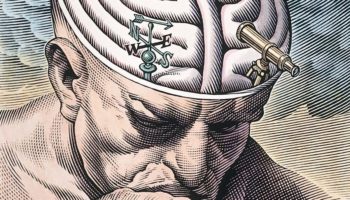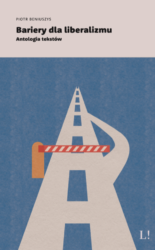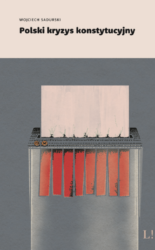Ryszard Legutko is an active politician, a Polish philosopher and a professor on the faculty of the History of Philosophy Department of the Institute of Philosophy at the Jagiellonian University in Krakow. A member of Poland’s Prawo i Sprawiedliwość (Law and Justice; PiS) party, which is situated on the right of the political spectrum, he is currently on sabbatical from the Jagellonian, serving as a member of the European Parliament and the head of the Law and Justice delegation there. In this capacity, he is also a co-chairman of the ‘Conservatives and Reformists’, a Eurosceptic fraction of the EU parliament.
In 2012, Legutko published a book in Polish, Triumf człowieka pospolitego. The literal translation of that would be ‘The Triumph of the Common Man’. However, it was translated and published in English in 2016 as The Demon in Democracy: Totalitarian Temptations in Free Societies[1].
This review of that book is a personal account of its highly negative and damaging influence on the discourse around democracy and politics in the first decades of the twenty-first century.
The Demon in Democracy is written as a narrative and its central thesis is that, in essence, communism and liberal democracy are equivalent systems in human history. In order to reinforce his premise, Legutko frequently uses a substitute for the word ‘systems’. That substitute is ‘regimes’[2] and it creates a subtle, profoundly motivated framing which aims to classify democracy as a bad form of socio-historic development.
The entire book is an attempt to prove his claim by examining five key aspects of sociopolitical systems, namely, the historical, the utopian, the political, the ideological and the religious. This review assesses the value of Legutko’s proofs for all five. To begin with, though, it looks at the reviewer’s first and main discovery, which is easily made by carefully reading Legutko’s arguments concerning them. This first discovery, and it is a very disappointing one, is that Legutko seems to have failed to understand the very term which describes the main target of his onslaught, in other words, ‘liberal democracy’. To Legutko, ‘liberal democracy’ is a democracy dominated by liberals or by the ideas referred to in politics as liberal. He succeeds in producing a convincing impression that, if his target were not democracy, but the modern educational system, he would render the ‘liberal arts’ as the sciences, arts and humanities dominated by liberal ideology!
This fallacy is not put forward by Legutko alone. When Victor Orban calls his form of government ‘an illiberal democracy’, he intends his fellow citizens to accept the negation of ‘liberal’ as a positive feature of his system. The problem, of course, is this; in the phrase ‘liberal democracy’, ‘liberal’ is an adjective and has a different meaning from ‘liberal’ used as a noun! Maybe neither Legutko nor Orban understands English well enough?
It certainly seems as if Legutko, a distinguished scholar at one of Europe’s most prestigious universities, has either never read or never fully comprehended a classic, and fundamental, definition of ‘liberal democracy’ such as:
A democratic system of government in which individual rights and freedoms are officially recognized and protected, and the exercise of political power is limited by the rule of law. ‘The objective of liberal democracy is not limitless freedom‘[3].
The foregoing conclusion is further corroborated by Legutko’s labelling of those who subscribe to such democratic ideas as “liberal-democratic man”[4] or “liberal man”[5]. The former term occurs quite frequently in the book.
Legutko’s take on history
If this were the only issue with the book, it might, perhaps, still have some merit. However, there is second fundamental problem, namely, the way in which its author justifies his central claim that, in essence, modern, western democratic systems are equivalent to communism. Chapter One, which scrutinises the historical aspect, opens with the words:
Let us begin with what seems obvious: that communism and liberal democracy share a similar perception of history[6].
This statement is disturbing to many, particularly to those who lived half of their life under the communist regime, as this reviewer did. Even more shocking is Legutko’s explanation of this similarity. First, he claims that it lies in the efforts to improve the social aspects of life under both systems and then he tries to equate the Marxist laws of history with thinking he ascribes to early exponents of democracy like John Stuart Mill, Immanuel Kant, Adam Smith and Frederic Bastiat, to name just a few. By so doing, he apparently forgets that the first, very rapid implementation of Marxist laws in Russia came in the wake of bloody revolution, while the steady growth of western democracies brought real and undeniable social improvements. In other words, Legutko takes the communist, propagandistic ‘effort to improve society’, which, in reality, covered the most brutal acts of those regimes, and equates it with the efforts that were implemented in western civilization, bringing the growth of the middle class and, generally, a genuinely better life for many millions of people. He appears to note that, unlike communism, liberal democracy has no ‘founding fathers’[7], and he claims that “the liberals and the democrats”[8] made use of the same historical pattern in their representation of liberal thinking.
Of course, he fails to substantiate that assertion in the book. He cites John Stuart Mills’ statement to the effect that:
The struggle between Liberty and Authority is the most conspicuous feature of history since the earliest times known to us [sic][9].
It seems hard to accept that, if an author decides to refer to Mills’ statement, they are signifying their alignment with the ideas of Marx, Engels or Lenin. To Legutko, though, Mills’ words are proof that his intentions and goals are similarly oriented. Applying the same kind of thinking, he gives the impression of trying to squeeze thinkers like Adam Smith, Frédéric Bastiat, Immanuel Kant and the people behind British Whiggism into the pit where the leaders of communism are buried! To anyone who knows the writings of these authors, this claim is beyond belief.
Nonetheless, Legutko presses on and asserts that communism and liberal democracy share three common threads, namely, belief in the unilateralism of history, belief in the efficacy of a deliberate human action and belief in mankind’s ability to achieve maturity and intellectual independence. First, though, it is absolutely not true that these lines of thought have dominated the modern discourse in liberal democratic[10] circles, a statement borne out, for instance, by Francis Fukujama’s most recent works[11]. Second, even if the two systems share some specific beliefs, it is logically impossible to equate them, particularly given that they are deeply contradictory to each other in every aspect. Elementary logic relating to reality prompts us to note that, if two objects have only a few properties in common, then simply equating them is unacceptable. Here, then, Legutko has committed what we might call a ‘meta-error’; in this case, it is the error of assuming that apparently similar methods or properties lead to an equivalence between the subjects they apply to. One might venture to say that this is a serious problem for someone whom some people regard as a philosopher!
At this point, one could list all the historical distortions in the History chapter. However, that would be a pointless exercise, because the view of modern history Legutko presents slams the door on any discourse, with assertions like this:
Just as in real socialism, so in real democracy it is difficult to find some nondoctrinal slice of the world, a nondoctrinal image, narrative, tone, or thought. In a way, liberal democracy presents a somewhat more insidious ideological mystification than communism[12].
The absurdity of this assertion is obvious. It is hard to understand how such notions could be purveyed by someone who, as he himself implies, has read works by giants like José Ortegay Gasset. Yet The Demon in Democracy suggests that Legutko is blind to that thinker’s fundamental thoughts:
Liberalism – it is well to recall this today – is the supreme form of generosity; it is the right which the majority concedes to minorities and hence it is the noblest cry that has ever resounded in this planet. It announces the determination to share existence with the enemy; more than that, with an enemy that is weak. It was incredible that the human species should have arrived at so noble an attitude, so paradoxical, so refined, so acrobatic, so antinatural[13].
Legutko’s brand of Utopia
For Legutko, liberal democracy is as utopian as communism. He claims that:
Both communism and liberal democracy are therefore perceived—from an inside perspective—as having no alternatives[14].
Before we dispute this patently false claim, we should look at Legutko’s arguments. His first line of reasoning turns once again to the mind of his mythical “liberal man”, as in, for instance:
Liberal democracy is also viewed by its supporters as the final realization of the eternal desires of mankind, particularly those of freedom and the rule of the people[15],
or, to provide another example:
Over time, the mind of a liberal democrat began to resemble that of a socialist, exhibiting the same tendency to combine the languages of morality and politics, as no other discourse could possibly do justice to the nature of the system[16].
This is one of the moments where he actually goes so far as to employ an accusative tone against the “liberal man” of his creation:
Even the most liberal of liberals displayed extraordinary softness against the Soviet Union and the Soviet communism and sometimes even actively supported the idea of unilateral disarmament of the West (…)[17].
Let this deconstruction of his reasoning begin with the last of these three assertions. In the twentieth century, we witnessed the total defeat of the Soviet system by liberal, western democracies. The fact that this was brought about not by an all-out war, but by peaceful means, does not render those democracies soft. On the contrary, the way in which liberal democracy won the cold war, quite simply, was both potent and efficacious! Unfortunately, Legutko does not explain who he deems to be those “most liberal of liberals”. In all probability, he would have been hard put to justify his argument by trying to provide any actual names. The reviewer, on the other hand, can do just that and it would quickly become obvious how baseless and erroneous Legutko’s claim really is!
As for the argument he posits in the first of the three quotations, to the effect that liberal democrats see “no alternatives”, it is simplicity itself to show that it was liberal democracy which, over the last, well-nigh two hundred years, has redefined itself dramatically, particularly when it comes to its most important systemic aspect, which is to say, its economy. Today, not one of the Western liberal democracies implements the libertarian ideas of an unrestricted free market. Over time, they came to understand that many domains, such as financial systems, environmental protection, and the fundamental shape of national health systems, cannot follow the initial paradigms which still shaped them in the first half of the twentieth century. When it comes to these fundamental facets of the societal strata, demonstrating the sweeping differences existing between countries rightly called “liberal democracies” today and their nineteenth-century predecessors presents no real challenge.
How it is possible for Legutko, a member of the European Parliament, to have failed to grasp this, is beyond comprehension. One instance of his reasoning can be found in his reference to thinkers Friedrich von Hayek, Ludwig von Misses, Ayn Rand and Robert Nozick. First, he pigeonholes them all as libertarians. While this is certainly just as regards Ayn Rand and Robert Nozick and verges on being just in the case of Ludwig von Misses, it is inarguably unjust when it comes to Friedrich von Hayek, a pure, classical liberal who never claimed that government intervention in the economy is wrong. In fact, to provide one example, he supported the notion of a social safety net designed to protect citizens from extreme poverty.
However, this particular aspect of Legutko’s thinking runs up against a much more important problem; he has apparently forgotten that the real liberal democracies have never strictly adhered to the ideas of these thinkers! On a superficial level, he seems to understand this, noting that “Democracy did not have obvious links with utopian thinking”[18]. In the very next sentence, though, we discover the way in which he understands the difference:
Since antiquity, democracy had been considered one of the defective systems; not better but certainly not worse than oligarchy or monarchy,[19]
which simply shows how shallow Legutko’s understanding of democracy is. Knowledge of the works of Tocqueville and Rawls has not helped him. As far as the latter is concerned, Legutko is guilty of a horrible fallacy, claiming that “The man who called the liberal-democratic political system a utopia was John Rawls (…)”[20]. Yet anyone who is familiar with Rawls’ works is well aware of the fact that he only ever used the word ‘utopia’ in the phrases
“realistic utopia”[21] and “realistically utopian”[22] and that his intended meaning was dramatically different, namely, that ‘the Laws of People’ are utopian only because they do not always reflect existing social arrangements, but they are realistic as they do not go against human nature[23]. It is thus obvious that Rawls’ phrase is more metaphorical than literal. Later on in the book, Legutko apparently admits that Rawls was the thinker behind the modern liberal-democratic system, but even then, he uses a pejorative term, “today’s liberal-democratic orthodoxy”[24], in order both to discredit the great thinker and to use his thoughts distortedly.
The striking thing about Legutko’s focus on ‘utopia’ is that it seems to be the only chapter of the book where he gives signs of suggesting that there are systems which are better than liberal democracy. It makes for interesting reading as it kindles the hope that some bright ideas might finally start appearing. In essence, liberal democracy’s ability to reinvent itself lies in its nature; history does, after all, clearly show us examples of that process. What a surprise lies in store for Legutko’s readers when he first points to better systems from the ancient world, systems proposed by Plato and developed by Aristotle. It is a well-known fact that Plato thought of democracy as a degenerate political system. Just a few paragraphs later comes Legutko’s vision of the ideal system:
One could therefore devise a political structure that combined monarchy, oligarchy, and democracy in such a way that each would foster the advantages and neutralize the disadvantages of the others. We would then have, for example, a democratic representativeness but at the same time some oligarchic-aristocratic institutions that would preserve a form of elitism as well as some form of monarchy guaranteeing the efficiency of governance.[25]
Here, the author’s intentions and views are laid bare. Legutko aches for a system that is, in essence, pure, oligarchic elitism and, if it takes the form of a monarchy, then so much the better.
The hopes of readers who approach the book expecting some genuine ideas for improvements to democracy are dashed. Legutko yearns for past systems with which we are all familiar and which have proved to be teeming with the injustice and exploitation served up to those who happened not to be of the elite by those who belonged to the oligarchy. If we then recall which political party Legutko belongs to, in other words, the right-wing, populist PiS, and which fraction he joined in the EU parliament, it becomes obvious exactly how dangerous his attempts to throw us back into the past really are. He genuinely hopes for such a revolution, even going so far as to call it a “European perestroika”:
The emergence of such beliefs in the EU spheres would encourage a European perestroika—something that the European Union might not survive[26].
This brings home to us precisely how perilous ideas of this kind are. Dressed in lofty declarations and backed up by the erudition of someone who is a scholar at one of Europe’s most prestigious universities, this thinking, in essence, condones autocratic tendencies, where a specific cast of the enlightened, belonging to the oligarchy and vouched for by pseudo-democratic elements, not only have unlimited power over society, but also lay claim to the right to formulate the moral norms which everyone else is forced to live by.
History tells us what ideas like this have led to…
Politics according to Legutko
Politics is yet another area where Legutko finds similarities between communism and liberal democracy. His depiction of the hypocritical attitude of communist ideologues towards politics is relatively accurate. However, the way he translates some of the ideas propounded by thinkers like John Locke, Benjamin Constant, Isaiah Berlin and Joseph Schumpeter into his own constructs is nothing more nor less than bizarre. For instance, he claims that Locke’s focus on the protection of private property by the state is an example of an attempt to describe human activities as non-political and that, in this context, the role of a private person contradicts their role as citizen. Incomprehensible! Of course, anyone who has read Locke or his commentators will be well aware of the depths of falsity in Legutko’s reading of the master. The reality is that Locke forged both a well-defined political theory and a theory of government, a fact which really is fairly common knowledge.
Legutko also distorts the views of Benjamin Constant when he writes:
In his famous lecture about the difference between the freedom of the ancients and that of the moderns, [Constant] argued that to participate in public life (which was the freedom enjoyed by the ancients) ceased to be a priority in our time and had been supplanted by the individual freedom to pursue private goals[27].
Since Legutko ignores the norm of providing references, the reader has no real idea as to which of Constant’s lectures he is referring to, never mind his exact point of reference. However, the reviewer is reasonably confident that it is his 1816 lecture, The Liberty of Ancients Compared with that of Moderns. Careful reading of that text reveals its author to have quite a different position:
Political liberty, by submitting to all the citizens, without exception, the care and assessment of their most sacred interests, enlarges their spirit, ennobles their thoughts, and establishes among them a kind of intellectual equality which forms the glory and power of a people. (…) I bear witness to the better part of our nature, that noble disquiet which pursues and torments us, that desire to broaden our knowledge and develop our faculties. It is not to happiness alone, it is to self-development that our destiny calls us; and political liberty is the most powerful, the most effective means of self-development that heaven has given us.[28]
In other words, Constant prizes political liberty, a pre-condition for liberal democracy, which did not even exist in 1816 and without which, as he points out, citizens lose the best tool for self-development. Legutko, however, suggests that Constant argued that people put the pursuit of their private goals higher. Total distortion!
Having created such distortions or, perhaps, having read the works of the thinkers in question and failed dismally in understanding them, it comes as no surprise to discover that Legutko comes to the conclusion that:
Liberalism is primarily a doctrine of power, both self-regarding and other-regarding: it aims to limit the power of other agents, and at the same time grants enormous prerogatives for itself[29].
This is so ridiculous that it warrants noting here as an example of the many claims he makes which have nothing to do with a true characterisation of reality. In this case, it begs the following questions. If liberalism is a doctrine of power, then what was communism a doctrine of? Or the oligarchic republicanism so much exalted by Legutko; that is a doctrine of what, precisely?
In direct contradiction to the fundamental principles of liberal democracy expressed so beautifully by Ortega y Gasset when he wrote that “it announces the determination to share existence with the enemy”, Legutko dares to make statements like “liberalism has always had a strong sense of the enemy”[30]. In the light of the aforementioned questions, his assertions of this kind have the ominous ring of a Große Lüge-type pronouncement…
The chapter on politics also introduces another form of distortion. This time, it is a twisting of history, a device which Legutko continues to employ in subsequent chapters. When he writes about the counterculture of the nineteen sixties, he uses the phrase “revolution of the sixties”, but provides no wider context, leaving any reader less well-informed about twentieth-century history with a picture of some kind of revolt that overthrew or radically changed the structures and political organisation of Western civilisation. However, nothing like that happened, of course, despite the important cultural impact which the anti-establishment phenomenon had on western societies. Legutko’s context-free ‘revolution’ thus provides a deformed image. We discover why he clutched at this particular rhetorical instrument when he first concludes that “at some point, the ’68 generation finally laid their hands on European integration”[31], leading to the construction of “a federal super-state”[32]and the creation of “a European demos, a new European man”[33] and then goes on to characterise the EU as a degeneration:
The European Union reflects the order and the spirit of liberal democracy in its most degenerate version[34].
It thus comes as no shock when the references to Hungary’s Fidesz and Poland’s PiS appear in the chapter. In Legutko’s words, both parties are examples of ‘righteous indignation’, a just resistance to that ‘degeneration’. False accusations follow, such as “Immediately after the elections [the EU] launched an extremely aggressive hostility campaign.”[35]. The truth is that the EU has never been hostile to any legally elected government. What it has been opposing is the serious attacks on the rule of law perpetrated by those two parties. In this context, it bears noting that, in 2019, another member of PiS, Janusz Wojciechowski, was appointed EU Commissioner for Agriculture[36], which gives the lie to Legutko’s line of reasoning.
As if this were not enough, Legutko then accuses liberal democracy of attacking families and communities:
Liberal democrats were guided by a similar assumption as the communists before them: both disliked communities for their alleged anachronism and, for that reason, thought them, because deep-rooted, to be the major obstacles to progress. Both believed that one cannot modernize society without modernizing communities, including rural areas, families, churches, and schools. Just as communism was not possible with families adhering to the feudal-patriarchal system, so liberal democracy is believed to be incomplete and unsuccessful with schools respecting traditional moral and cultural authoritarianism[37].
The blatant falsity of accusations like this is so obvious that the reader wonders where Legutko gets his conclusions from. Certainly not from liberal democracies, which protect communities; the EU has a series of strong programmes for social protection and social inclusion, for instance[38]. Not from rural communities, either, where the scale of agricultural subsidies in numerous liberal democracies speak for themselves.[39]Families cannot be his source, since the protection of families is a high priority for the EU, which lists “the right to respect for family life” as one of the fundamental human rights.[40] As for churches, under no other political system of modern times have churches enjoyed such a level of freedom.
The chapter then moves on to proffer another flavour of Legutko’s thought, which equates the protection of minorities in liberal democracies with the protection of women’s and LGBTQ’s rights:
Women, homosexuals, Muslims, ethnic groups are being perceived as and transformed into quasi-parties, organized from above by the political or ideological leadership and not possessing other characteristics than those resulting from the struggle for power against other groups and no other identity than that provided by this leadership, allowing no ideological dissent[41] [sic].
It is worth noting how bizarre Legutko’s thinking about women is. To him, being a woman in a liberal democracy is as abstract as being a member of the proletariat under communism was:
Just as the “proletariat,” “women” is an abstract concept that does not denote any actual existing community, but only an imagined collective made an object of political worship among feminist organizations and their allies[42] [sic].
The readers of Legutko’s book may wonder why the author does not believe in the basic values we all share, despite political differences. One such basic value is dialogue. Nowhere is this practiced better than in democracy. To him, however, the spirit of dialogue in democracy is false and hypocritical:
(…) it does not require much effort to see that the dialogue in liberal democracy is of a peculiar kind because its aim is to maintain the domination of the mainstream and not to undermine it.[43]
He continues thus, without limits or considerations. To provide just one example:
The liberal-democratic man politicized his privacy, perhaps his main contribution to the change in thinking about politics. He politicized marriage, family relations, communal life, language. In this he resembled his communist comrade.[44]
This narrative might, perhaps, speak to some young hotheads who did not live under communism. The reviewer, did, and to him, such claims represent blatant nonsense, to say the least. They are offensive to those who fought against communism in order to embrace democratic values.
When Legutko touches on moral matters, things get even worse. As he sees it, the essence of societal changes that occurred in nineteen-sixties is:
(…) the real great sexual revolution (…). What happened then was—in terms of scope and content—far more radical than anything in the past.[45]
This, too, he equates with:
(…) the old communist plan to overthrow the repressive power structures, including marriage and family[46]
What is worse is this; to him, the equalisation of women’s and men’s rights is one of the symptoms and the beginning of the revolution. Whenever Legutko attacks homosexuals, the word ‘homosexuals’ is almost always coupled with ‘women’ or ‘feminists’. What a perspective!
Legutko’s ideology
The chapter on ideology begins with the claim which permeates Legutko’s entire treatise:
Both communism and liberal democracy have a strong tendency to ideology[47] [sic].
The fact that communism was a highly ideologised system is no news at all to anyone who is familiar with it, either from literature or from their lived experience. However, it does come as quite a shock to the conscious reader to discover that, as averred by Legutko, liberal democracy is no different. Despite the ubiquitous presence and apparentness of ideology in communism, Legutko devotes more or less the entire first section of his fourth chapter to proving that communism was ideologised.
The second section then starts with what reads as an admission that the opening sentence was a provocative joke:
One should think that liberal democracy is relatively free from ideological temptation. The emergence of one unifying ideology seems rather unlikely when there is considerable differentiation in a society, and it is precisely such a differentiation that liberal democracy promised to tolerate and even stimulate.[48]
Legutko refers to thinkers like Daniel Bell, Seymour Martin Lipset, Edward Shils and Raymond Aron and apparently agrees that liberal democracy exhibits a greatly reduced level of ideology. Where, then, is the problem? Why does he take an entire chapter to tackle the ideology of democracy?
The answer arrives later on in the chapter, where the reader comes up against what is, perhaps, one of the finest examples of dystopian distortion ever to be encountered in modern discourse. Legutko claims that the nineteen sixties were an era of ideological explosion. His reading is peopled by radicals calling for the system to be overthrown and replaced by something else. One can only marvel at where he obtained this picture of the sixties’ counterculture. From the communist propaganda that dominated schools in Poland? After all, that was the decade when Legutko underwent his secondary education. In reality, though, the essence of the social revolution lay in a denial of the ideologies predominant in the western world during the post-war era. It would be a distortion of meaning to call the civil rights movement or anti-war trends ‘new ideologies’ and a kind of mental blindness to dub Joan Baez or The Beatles or Kurt Vonnegut ‘new ideologues’.
Seen from Legutko’s standpoint, though, it was all was nothing more nor less than an “ideological smokescreen”[49]. Then he arrives at his much-cherished bête noire, the European Union and the revelation that:
In the European Union the ideology has been emanating with such intensity that each prolonged contact with its institutions requires a thorough detoxification of one’s mind and one’s language.[50]
What follows reads like a fantasy from a deeply hostile mind:
The liberal-democratic mind, just as [sic] the mind of a true communist, feels an inner compulsion to manifest its pious loyalty to the doctrine. Public life is full of mandatory rituals in which every politician, artist, writer, celebrity, teacher, or any public figure is willing to participate, all to prove that their liberal-democratic creed springs spontaneously from the depths of their hearts[51].
Only a few sentences later, Legutko’s distortions suddenly become easier to comprehend, as he admits that respect for the rights of women, minorities and the victims of violence is what he is terming ideology:
(…) one is expected to give one’s approving opinion about the rights of homosexuals and women and to condemn the usual villains such as domestic violence, racism, xenophobia, or discrimination (…)[52],
before adding insult to injury by adding environmental awareness to the list!
At this point in the book, it becomes clear that it is Legutko who subscribes to some strange and dangerous right-wing ideologies which glorify a misogynistic style of thinking and hatred of everyone who is different,whilst simultaneously denying any need to protect the environment. In essence, his invented “ideology of liberal-democracy” is nothing more than a projection of his own thoughts onto a very different reality.
This review now passes over a considerable part of what then ensues in the chapter on ideology; it proffers a level of discourse that is not even worthy of comment:
(…) a proletarian was replaced by a homosexual, a capitalist by a fundamentalist, exploitation by discrimination, a communist revolutionary by a feminist, and a red flag by a vagina[53].
In the last part of the chapter, Legutko tries to prove his patently false claim that liberal democracy, striving to protect equality between people, is a form of despotism:
(…) egalitarianism and despotism do not exclude each other, but usually go hand in hand. (…) Equality invites despotism[54].
Then, for a moment, it seems that he has grasped either the falsity of that claim or the falsity of his comparison of liberal democracy to communism, as he admits that communism was deeply anti-egalitarian in nature[55]. Not that this stops him from flogging his main theme even further:
In every sentence from the Leninist and Stalinist catechisms one can replace “proletariat” with “women” or with “homosexuals,” make few other minor adjustments, and no one will recognize the original source[56].
He considers that both systems imposed an imperative on people “to side with one and be against the other”[57]. Bearing in mind the quality of life in all liberal democracies, it is pointless even endeavouring to argue with such claim. The very essence of the system, together with its practice over recent generations, gives the lie to Legutko’s reasoning.
Wading on, he tries to posit that the similarity of both systems led the liberal democratic leaders to like communist leaders for their:
(…) redeeming features—Andropov was fond of whiskey, Gierek spoke French, Kádár invented goulash communism[58],
and that the EU protected “former and present-day communists[59]”. Again, everybody who lived through the last years of Eastern European communism and its end in1989 knows that any accusation of that kind is baseless. Not that this seems to concern Legutko, though!
What does Legutko know about freedom of religion in the Western World?
The final chapter of Legutko’s book turns to religion and begins by recalling the communist hostility to it. There are no surprises here. The communists were deeply hostile to religion. However, somewhat out of keeping with the theme of the chapter, Legutko then goes on to elaborate on the apparent acceptance of the communist cause by numerous prominent figures of the post-war era. He takes as his starting point the Polish intellectuals who signed the infamous resolution of the Union of Polish Writers in Krakow concerning the Krakow spy trial; that resolution supported the communists’ prosecution of priests falsely accused of spying. Then he turns to figures like Karl Barth, Paul Tillich, Jacques Maritain and Hewlett Johnson, emphasising their sympathies toward communism. However, an analysis of whether or not it is just to brand all these people as communist sympathisers falls outside the scope of this review and must await a different occasion.
Then, though, Legutko states that the communists’ anti-religious tendencies led to the hostility of elites towards religion after the fall of the communism and, with that, he is plainly lying. In Legutko’s native country, at any rate, the underlying motivation of the majority of anti-communist fighters was deeply religious. It is enough to recall the profoundly Christian symbolism used by Solidarity leader Lech Wałęsa and the admiration of all the new democratic leaders for Pope John Paul II in order to see that Legutko is attempting to build a strange narrative with no obvious cause. Even his personal bête noire, historian, essayist, print-media editor and former dissident Adam Michnik, to whom he falsely assigns not only the proclamation of “the end of the entente cordiale with the Church”, but also an ability to “dictat[e] to the Polish herd of independent minds which way they should be going[60]”, was never either anti-religion or anti-Church[61].
Before long, his reason for trying to set up this odd narrative becomes clear. He needs it in order to present yet another false claim:
The attitude of liberalism toward religion was, from the start, frosty and sometimes hostile[62],
and, a little further on:
This began to change in recent decades when the European governments, by having espoused an ambitious ideological mission, started legislating morality in an open confrontation with the teaching of Christianity (and other religions).[63]
To prove these claims, Legutko tries to convince his readers by accusing democracy of regulating religious and moral matters as follows:
What we enforce is the law of the land and constitutional rights—be it in the matters of abortion, marriage, education, life, death—and not religion, and what we supervise is not the people’s souls, but our citizens’ loyalty to the existing legal and political system.[64]
In the book, this is set between quotation marks. However, not for the first time, Legutko fails to provide any hint of a source. It certainly seems to be nothing more nor less than a figment of his imagination. No known democratic system implements that kind of rule. Even with the most contentious issues, like that of abortion, for instance, the system allows its citizens full freedom to apply their religious rules in their lives. Of course, in most cases, democracy also protects those who profess different views and their right to express them, as well as preventing one group of people from imposing their rules on another group and, in particular, on minorities. These important principles are ignored by Legutko, though.
Moving on, he tries to convince us that thinkers like Hobbes, Kant, Jean-Jacques Rousseau and Bertrand Russell prepared the ground for the “anti-Christian”[65] sentiments in modern democracies. Disputing that claim in full requires a separate response. Here, suffice it to say that it represents a huge oversimplification and massive exaggeration. For example, while Jean-Jacques Rousseau is now regarded as ‘an anti-theological theologian’, to paraphrase the term coined by Carolina Armenteros of Pontificia Universidad Católica Madre y Maestra[66], by no means he could be labelled as a promoter of anti-religious sentiments. In an excellent piece entitled “The Anti-Theological Theology of Jean-Jacques Rousseau” she writes:
Rousseau’s theology, like much of his philosophy, is paradoxical. It comprises both a rejection of traditional Christian dogma—notably original sin—as incommensurate with reason, and a defense of Christianity and political religion as institutions transcending the rationalism of the Enlightenment.[67]
“Had we but world enough and time”[68], we could analyse the other thinkers Legutko blames for this anti-Christian attitude and show exactly how trivial and superficial his accusations are.
Some of the references he reaches for teeter on a brink of satire. For example, when he accuses EU governments of not reacting to the persecution of Christians, he reaches for a term coined by Joseph H. H. Weiler, ‘Christophobia’[69]:
Paralyzed by their Christophobia (to use Joseph H. H. Weiler’s wellknown [sic] expression), the European Union as well as the European governments [sic] do not react [sic] to the brutal persecution of Christians in other continents, and if they do, their reaction is low-key[70].
However, true to form, he fails to mention the context in which Weiler used it, namely:
It is a Europe that, while celebrating the noble heritage of Enlightenment humanism, also abandons its Christophobia and neither fears nor is embarrassed by the recognition that Christianity is one of the central elements in the evolution of its unique civilization. It is, finally, a Europe that, in public discourse about its own past and future, recovers all the riches that can come from confronting one of its two principal intellectual and spiritual traditions[71].
This juxtaposition of the two quotations shows how Legutko has distorted both Weiler’s intentions and his term in a crystal-clear example of a false, mendacious interpretation. Yet another instance occurs with his lament about the Lautsi v. Italy case[72] and the opinions issued by the various countries, he somehow ‘forgets’ to add that the final resolution of the European Court of Human Rights was that requirement does not violate the European Convention of Human Rights. He also seems to have had a mental blank when it came to noting that the same Joseph Weiler:
(…) took the case pro bono — arguing that forcing Italy to take down the cross would be a blow not against Christianity, but against pluralism[73].”
The truth is that all Legutko’s accusations describing both liberal democracy in general and the European Union as hostile are plainly false. For example:
In today’s Europe, the power has been in the hands of the political class hostile to Christianity (…)[74]
The blatant mendacity of that statement is exposed by the fact that the largest political block in the European Parliament is actually formed by Christian Democracy! The breadth of development in Christian philosophy and theology, mostly in western Europe, is another nail in the coffin of his spurious claims. Mentioning thinkers like Henri de Lubac, Yves Congar or Hans Urs von Balthasar, to name just a few, also somehow ‘slips his mind’. His writing suggests that he is ignorant, too, of the ressourcement, that great movement and true rediscovery of the wisdom of Christian tradition that occurred in many centres of liberal democracy. These trends were not restricted to academic theology, either, since they laid ground for such momentous and positive changes as those initiated by the Second Vatican Council. Why is there no mention whatsoever in the book of such important developments?
Could it be that Legutko has deeper motivations for spread his lies or is it that, despite living in Western democracy, he really has no knowledge of it at all. Take this sentence, for instance:
Is not—one may wonder—this nonreligious and antireligious reality of today’s Western world very close to the vision of the future without religion that the communists were so excited about, and which despite the millions of human lives sacrificed on the altar of progress, failed to materialize?[75]
How can a statement like that be substantiated at all in the light of all the many religious movements developing freely in the western world? It seems that Legutko has never experienced any interaction with communities like the Amish in the US or the Mennonites in Canada, who have strongly redefined every aspect of their lives and no ‘liberal democrat’ has ever tried to turn them away from their religion. In absolute numbers, Legutko’s main object of disdain, the EU, is the world’s largest Christian population, with more than seventy-five per cent of its residents identifying themselves as Christian.
Conclusion
In the conclusion to his book, Legutko assigns to liberal democrats a conviction that their world has come to the end and that it cannot change. This might be an indirect reference to Francis Fukuyama’s famous work, The End of History and the Last Man[76]. To readers of Fukuyama’s book and to all those who have observed or studied the evolution of liberal democracy over the course of the twentieth and twenty-first centuries, the imputation is obviously false. To Legutko, though, it is “a final confirmation that [in liberal democracy] mediocrity is inveterate[77]”.
Surely the evolution of the entire Western hemisphere’s political and social system during the last one hundred and twenty years is impossible to ignore. So it is interesting to ask why Legutko ignores it? Is he ideologically motivated by his right-wing, populist, Law and Justice party? Did he therefore write the book to vindicate their policies? Or, perhaps the opposite is true that his dystopian thinking actually motivates his political circle and its leader, Jarosław Kaczyński?
Whatever the answer to these questions may be, one thing is certain. Legutko’s criticism of western democracy is not followed by any reasonable suggestion as to how democracy could evolve to avoid the “mediocrity”. His only input here is a throwback to “a political structure that combine[s] monarchy, oligarchy and democracy[78]”. A scrutiny of what is now happening in his homeland under the rule of the Law and Justice party reveals a literal, and very bad, combination of crippled democracy and an oligarchy enjoying the fruits of impunity. Turning this perspective onto his book suggests that only answer to the questions here is that Legutko is one of the most important ideologues of his right-wing, regressive political party and that his book is almost a blueprint for their agendas.
Viewed in this light, the reviewer felt that it was extremely important to debunk all the fallacies and accusations set out therein by Legutko and directed at western democracy.
References
[1] Ryszard Legutko, The Demon in Democracy: Totalitarian Temptations in Free Societies, Teresa Adelson (transl.), Encounter Books, New York · London, Kindle Edition, 2018. Page numbers in the subsequent references are from the Kindle readers numbering order.
[2] ‘Regime’ or ’regimes’ occurs almost ninety times in this context.
[3] https://www.lexico.com/definition/liberal_democracy, retrieved on 09/24/2021.
[4] Legutko, ibid., p. 30 passim.
[5] Legutko, ibid., p. 77.
[6] Legutko, ibid., p. 16.
[7] Legutko, ibid., Legutko numbers Karl Marx, Vladimir Lenin and György Lukács amongst the family of “founding fathers”. Omitting Engels and including Lukács is also absolutely characteristic of his approach. The fact that he passes over Lukács’ opposition to Stalinism is telling.
[8] Legutko, ibid.,
[9] John Stuart Mills, On Liberty, 1859, as cited in Legutko, ibid. N.B. It is provided as a direct quotation in the English translation of his book, but it is actually partly paraphrased and is not a complete sentence in itself, as it appears The Demon… The full, original sentence, which comes from the Introductory to the work, reads: “The struggle between Liberty and Authority is the most conspicuous feature in the portions of history with which we are earliest familiar, particularly that of Greece, Rome and England.”; Project Gutenberg, https://www.gutenberg.org/files/34901/34901-h/34901-h.htm, retrieved on 09-25-2021.
Should Legutko therefore not have cited it as ‘(…) “The struggle between Liberty and Authority is the most conspicuous feature (…) of history” since the earliest times known to us.’?
[10] Legutko, ibid., Foreword, p. VII.
[11] See Francis Fukujama, Identity: The Demand for Dignity and the Politics of Resentment, Farrar, Straus and Giroux, New York 2018; Political Order and Political Decay: From the Industrial Revolution to the Present Day, Farrar, Straus and Giroux, New York 2014; The Origins of Political Order: From Prehuman Times to the French Revolution, Farrar, Straus and Giroux, New York 2011.
[12] Legutko, ibid., p. 22.
[13] José Ortega y Gasset, The Revolt of the Masses, Anthony Kerrigan (trans.), University of Notre Dame Press, 1985, p. 65.
[14] Legutko, ibid., p. 43.
[15] Legutko, ibid., p. 44.
[16] Legutko, ibid., p. 45.
[17] Legutko, ibid., p. 46.
[18] Legutko, ibid., p. 50
[19] Legutko, ibid., p. 51
[20] Legutko, ibid., p. 52.
[21] John Rawls, The Law of Peoples: With “The Idea od Public Reason Revisited, Harvard University Press 1999, p. 4, passim.
[22] Legutko, ibid., p. 6, passim.
[23] See, for example, an excellent work by Chris Brown, The Construction of a ‚Realistic Utopia’: John Rawls and International Political Theory, in: Review of International Studies, Vol. 28, No. 1, Jan. 2002, pp. 5-21.
[24] Legutko, ibid., p. 52.
[25] Legutko, ibid., p. 53.
[26] Legutko, ibid., p. 69.
[27] Legutko, ibid., p. 75; reviewer’s emphasis.
[28]https://archive.is/20120805184450/http://www.uark.edu/depts/comminfo/cambridge/ancients.html#selection-11.0-17.23, retrieved on 09-25-2021; reviewer’s emphasis.
[29] Legutko, ibid., p. 77.
[30] Legutko, ibid., p. 77.
[31] Legutko, ibid., p. 86.
[32] Legutko, ibid., p. 86
[33] Legutko, ibid., pp. 86-87.
[34] Legutko, ibid., p. 85.
[35] Legutko, ibid., p. 89.
[36] https://en.wikipedia.org/wiki/Janusz_Wojciechowski, retrieved on 09-25-2021.
[37] Legutko, ibid., p. 91.
[38] https://ec.europa.eu/social/main.jsp?catId=756&langId=en, retrieved on 09-25-2021.
[39] https://en.wikipedia.org/wiki/Agricultural_subsidy, retrieved on 09-25-2021.
[40] https://www.coe.int/en/web/impact-convention-human-rights/family, retrieved on 09-25-2021.
[41] Legutko, ibid., p. 95.
[42] Legutko, ibid., p. 93.
[43] Legutko, ibid., p. 97.
[44] Legutko, ibid., p. 105.
[45] Legutko, ibid., p. 107.
[46] Legutko, ibid., p. 106.
[47] Legutko, ibid., p. 113.
[48] Legutko, ibid., p. 117.
[49] Legutko, ibid., p. 119.
[50] Legutko, ibid., p. 120.
[51] Legutko, ibid., p. 120.
[52] Legutko, ibid., p. 120.
[53] Legutko, ibid., p. 123.
[54] Legutko, ibid., p. 133.
[55] Legutko, ibid., p. 132.
[56] Legutko, ibid., p. 138.
[57] Legutko, ibid., p. 138.
[58] Legutko, ibid., p. 140.
[59] Legutko, ibid., p. 141.
[60] Legutko, ibid., p. 150.
[61] To the surprise of many, Adam Michnik was expressing positive and friendly views about the Catholic church during the time of writing of this review. See: https://wiez.pl/2021/04/04/michnik-odrzucam-myslenie-w-ktorym-nie-ma-miejsca-na-zyczliwosc-dla-kosciola/ , retrieved on 09-25-2021.
[62] Legutko, ibid., p. 151.
[63] Legutko, ibid., p. 154.
[64] Legutko, ibid., p. 153.
[65] Legutko, ibid., p. 146, passim.
[66] Carolina Armenteros, “The Anti-Theological Theology of Jean-Jacques Rousseau” in The Oxford Handbook of Early Modern Theology, 1600-1800, Ulrich L. Lehner, Richard A. Muller, and A. G. Roeber (eds.), Oxford Handbooks Online, September 2014, retrieved on 09-25-2021.
[67] Carolina Armenteros ibid.
[68] Andrew Marvell, “To his Coy Mistress”, 1681.
[69] Joseph H. H. Weiler, A Christian Europe: An Exploratory Essay, cited on https://www.firstthings.com/blogs/firstthoughts/2012/11/does-it-make-sense-to-speak-of-christophobia, retrieved on 09-25-2021.
[70] Legutko, ibid., p. 161.
[71] Weiler, ibid.
[72] The case concerned the requirement, under Italian law, for crucifixes to be displayed in school classrooms; cf.: https://en.wikipedia.org/wiki/Lautsi_v._Italy, retrieved on 09-25-2021. https://hudoc.echr.coe.int/app/conversion/pdf/?library=ECHR&id=001-104040&filename=001-104040.pdf , retrieved on retrieved on 09-25-2021.
[73] John L. Allen Jr., Tackling taboos on Jews and Christians, the cross and deicide, in “National Catholic Reporter”, Jan 21 2011, retrieved from
https://www.ncronline.org/blogs/all-things-catholic/tackling-taboos-jews-and-christians-cross-and-deicide, retrieved on 09-25-201.
[74] Legutko, ibid., p. 164.
[75] Legutko, ibid., p. 168.
[76] Francis Fukuyama, The End of History and the Last Man, Free Press, 1992.
[77] Legutko, ibid., p. 182. This is the last sentence of the book.
[78] Legutko, ibid., p. 53.





















